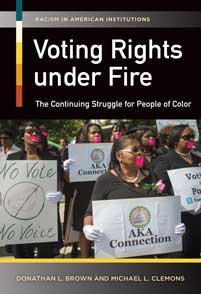Recently, R3 had an opportunity to interview Donathan Brown, co-author (with Michael L. Clemons) of the new book Voting Rights Under Fire: The Continuing Struggle for People of Color (Praeger, 2015).
R3: What lead you and your to write this book?
DB: We felt that the continual onslaught of states passing voter identification laws, the continual court challenges, along with the overall controversy these measures created was reason enough to dig deeper. Claims over the widespread existence and influence of in-person voter fraud continued to fuel much debate throughout the country. GOP lawmakers in states like Colorado, Florida, Arizona, Iowa, Nevada and Texas, among others, claimed that voter fraud was alive and well and have gone to great mediated lengths to saturate the headlines with this dubious message.
Therefore, intrigued by the timing of these laws, especially against the grander backdrop and growth of majority-minority cities, we were in agreement that there is more here than what meets the eye. To further solidify our thoughts, once the video footage of Pennsylvania Republican Representative Mike Turzai was released that showed him stating, ” Voter ID, which is going to allow Governor Romney to win the state of Pennsylvania, done,” we knew we had to act.
R3: Why do you both feel that the book is important now?
DB: First, with more than thirty states now requiring some form of voter identification, this book articulates the curiosity and ultimately the findings of multiple legal and political inquiries that sought to go beyond the press releases, the television interviews and the campaign speeches. Chief among the goals of this book is to highlight not only the past and present underpinning racial dimensions involved throughout the political legacy of voting rights, but more importantly, to illustrate how such past actions continue to guide current controversies pertaining to African American and Latino voting rights.
Second, as the once “solid south” finds itself on the verge of becoming purple, political dynasties now find their influence in danger. Combined with shifting racial demographics along with the 50th anniversary of Selma, this book presents both the timely and timeless political and legal battles over representation. The importance of this book exists not only within its diachronic approach toward understanding past and present struggles over voting rights, but how voter identification laws are thinly veiled racially retrogressive measures.
Finally, while much of the political rhetoric surrounding changes to voter identification laws employ arguments in defense of so-called “voter fraud” as their justification, there are considerable reasons to believe that race exists as a significant, albeit downplayed, placeholder within this debate. For instance, since Latinos overtook African Americans in 2004 to become the nation’s largest and fastest growing “minority” group, and have already displaced whites as the majority in various parts of the county, it would be shortsighted of us not to consider this variable. Our focus, therefore, is the centrality of race as a factor in the political behavior and rhetoric associated with the ongoing debate over voting rights in the United States.
R3: What were the biggest surprises in your findings?
DB: We were quite surprised, when upon reviewing court documents, to discover the flimsy nature of evidence that some courts allowed and accepted as fact. In one case, a lower court judge noted the serious demeanor and concerned facial expressions of one government official, whereas a result, and without actual evidence to rejoin the plaintiffs claim of retrogression, sided with the defendant. Another example is, of course, the infinitesimal statistical findings of actual in-person voter fraud. Here, in places like Arizona, for instance, we found state-provided court data that contradicted claims made by former Attorney General Tom Horne. Specifically, we found and noted that it is one thing to be charged with voter fraud, but another for those charges to be dismissed due to lack of evidence.
R3: Any closing remarks?
DB: As the investigative reports continue to culminate and the evidence pertaining to voter fraud continues to illustrate that such fraud remains minuscule, only a few arguments have remained accurate over time. Chief among these claims is the belief that voter identification laws, whether acknowledged or not, exist to diminish voter participation among groups who typically sway Democratic. These groups, whether they be African American, Latino, the elderly, those on the lower end of the socioeconomic ladder, or those who are mobility impaired, are all retrogressively impacted by these laws. If the data supported the claims made by GOP lawmakers who are calling for voter identification laws, then this book would approach the topic differently.
As it is however, these supporters have failed to “show their work”; they have failed to satisfy any rhetorical burden of proof to prove to dissenters that these efforts are not politically motivated. At no point throughout the lifespan of this book did we uncover any evidence by any political group or lawmaker that states (1): voter fraud is a widespread problem downplayed by the media; (2) that these reform efforts are actually for the better and not for the worst; and (3) race plays no part in the deliberation and implementation of these laws.
Following exhaustive legal research, obtaining and analyzing state level data sets, reviewing past Congressional hearings, records, court decisions along with current political trends and debates, I am extremely confident when saying, “widespread voter fraud is a myth,” and indeed retrogressive. The simple truth is that enacting harsh voter identification laws for the sake of “securing” the ballot box remains to be a solution to a nonexistent problem.
Donathan L. Brown, PhD, is associate professor and editor of the Journal of Race and Policy in the Department of Communication Studies at Ithaca College. He is the lead author of Praeger’s When Race and Policy Collide: Contemporary Immigration Debates. His published works on race and public policy have appeared in numerous outlets, including Harvard Journal of Hispanic Policy, Journal of Latino-Latin American Studies, International Journal of Discrimination and the Law, and Communication Law Review, among others.
Michael L. Clemons, PhD, is associate professor and founding editor of the Journal of Race and Policy in the Department of Political Science and Geography at Old Dominion University, Norfolk, VA. His published works have appeared in numerous media outlets and his edited volume African Americans and Global Affairs: Contemporary Perspectives was recognized by Choice as one of its Outstanding Academic Titles.













